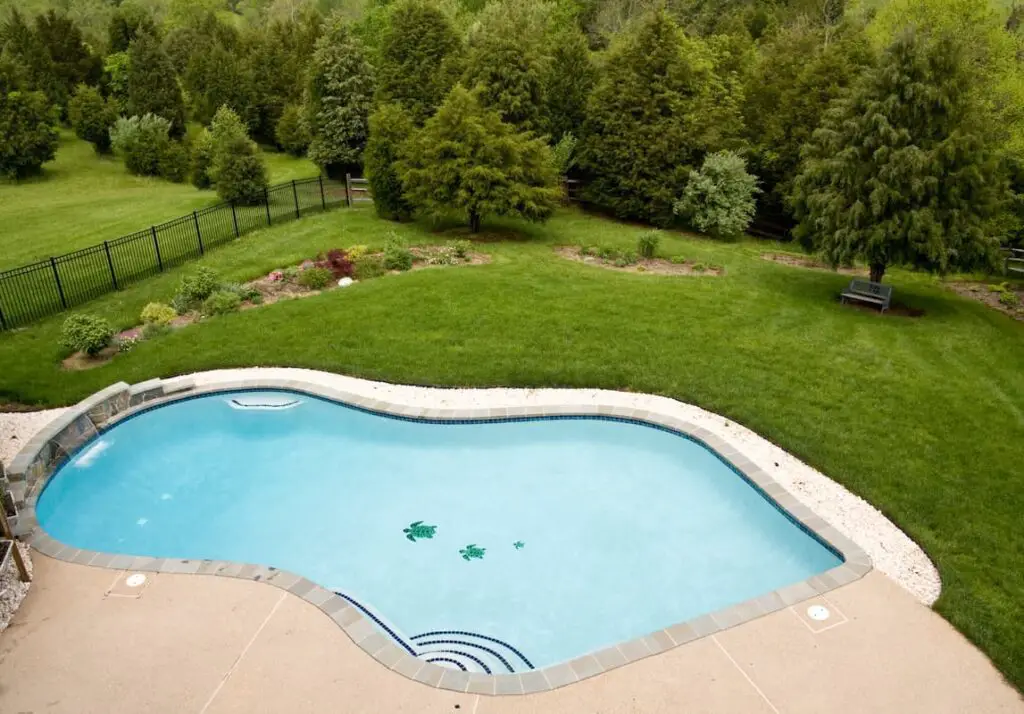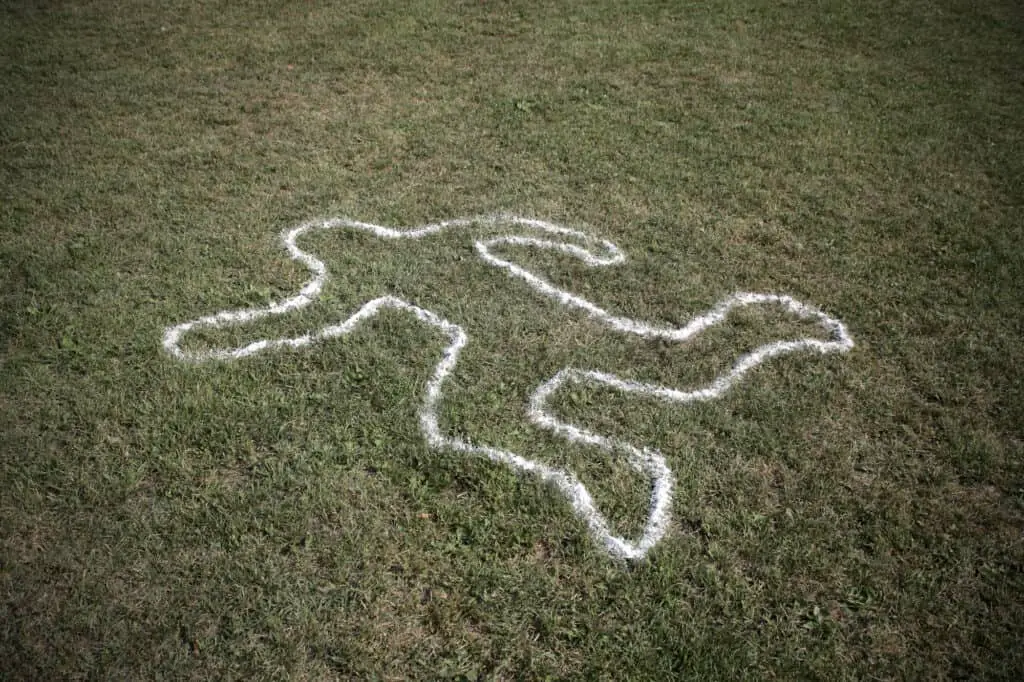So you’ve got your pool set up in your back yard and it’s time for the summer fun to begin. Friends and family all can rejoice now that you’ve opened your pool for the season and the parties begin in full. If you’re sticking with the trends of an in-ground pool or you own an above-ground pool, chances are your pool is surrounded by grass.
Can the splashing of pool water hurt your grass?
Many homeowners are worried about the health and safety of their grass, raising questions about whether or not pool water will kill your lawn. While it’s true that pool water includes chemicals like chlorine and salt, is it enough to kill the grass surrounding your pool?
With so much splashing and playing in the water and the dripping of wet bathing suits, it’s a fair worry to have!

Related Reading: How to Get Grass Clippings Out of Mulch [6 TIPS]
Pool Water and Grass, Can They Mix?
Luckily, your grass should be fine if your pool water is properly cared for. The little amount of water that gets on your grass will not be enough to have much, if any, effect the soil. The drips from swim gear and the splashing of pool water will be so insignificant that your grass won’t even notice a difference.
However, if the amount of water getting on your grass does begin to cause damage to your lawn, it’s likely because of the chlorine and salt amounts.
Overall, there isn’t much to worry about when it comes to your lawn health. The amount of pool water that gets on your lawn will likely not be enough to directly affect the soil composition. This isn’t to say that the worries are unfounded – too much chlorine and salt can indeed be a bad thing for your lawn.
It’s important to keep your pool clean, but also heed the needs of your surrounding lawn.
Is Chlorine a Bad Thing For Your Grass?
Chlorine on its own is a dangerous chemical that can be harmful when undiluted. Luckily, once mixed into your pool, it becomes mostly diluted and acts as the perfect cleaning chemical that causes no harm to you or the people around you – other than that annoying sting in your eyes.
This also applies, for the most part, to your lawn. Small applications of this diluted chlorine will not hurt your grass.
However, if the chlorine is undiluted or given to your grass in massive quantities, then you’ll start to see dead patches of grass. This means that if you end up spilling raw chlorine on your lawn, dilute it immediately. Pour plenty of freshwater over the spot where you dropped the chlorine to save your lawn.
It also means that when emptying your pool, be careful of the grass surrounding it. Even though the chlorine is diluted, the amount of chlorine poured over your grass when emptying the pool can be dangerous.
Make sure that the chlorine levels of your pool are lower than 0.1 PPM as this is the maximum safe amount for the grass around your pool.
And speaking of chemicals on grass, you can check out our post: does pressure washing with bleach kill grass?
Will Saltwater Pools Kill Your Lawn?

Many pools have started to use saltwater rather than freshwater. It’s easier to take care of and offers a more elegant finish to your pool. The main drawback of saltwater pools is their effect on the surrounding grass. The same mindset of chlorine water can be applied to saltwater: small amounts will not have a massive effect on your lawn.
However, the threshold for dangerous levels of salt is much lower than with chlorine. While a few splashes here and there won’t be enough to kill your lawn, it might be smart to water your lawn after a couple days of straight pool use.
Splashes and dripping bathing suits can build up and the salt will cling to your lawn much more than chlorine. Give your lawn a nice fresh water drizzle after a couple of days.
Salt is pretty bad for your lawn which is why the threshold is so much lower than chlorine. The difference between salt and chlorine is that salt goes for the roots of the grass whereas chlorine goes for the soil. This isn’t to say that chlorine isn’t dangerous for your lawn. However, salt requires much more care and preventative measures than chlorine pools.
Keeping Your Surrounding Lawn Safe
Sometimes, caring for your pool water isn’t enough to keep your lawn safe. Homeowners might be forced to take preventative measures for their lawn. It’s important to make sure that chlorine levels and salt levels are safe for your grass and the plants around your pool, but sometimes even that safety can cause damage to your yard.
Other Plant Life Can be Effected
It’s not just grass that can be effected by too much salt or chlorine – trees and plants are both susceptible to an unbalanced diet of chemicals. Luckily, the same idea of a little splash here and there won’t be detrimental to their health.
However, when emptying your pool where trees and plants might be in the way, it’s important to guarantee that the levels of chemicals in your water are properly diluted as to not be harmful to your plant life.
Terrain Alternatives
Luckily there are some alternative options for keeping your lawn looking amazing without risking it to the salt water or chlorine in a pool. One option is to monitor the levels of chemicals in your pool and adjust them to match the needs of your lawn. Another choice would be to change the layout of your yard so that grass is as far from the pool water as necessary.
The third alternative is to change the terrain type and utilize turf that is specifically able to handle increased levels of chemicals. There are specific types of grass that are native to saltier regions near the ocean that have lived in and can handle higher amounts of salt. If your saltwater pool gets plenty of use and tends to spill over, then perhaps salt-proof grass is a good option for you.
Most grasses should be able to handle chlorine, but grass that can handle basic chemicals would be preferable. Just remember to keep diluting your chlorine so that the damaging effects are greatly reduced. With a chlorine pool, you won’t be forced to consider alternative terrain types as long as you’re willing to put in the work to take care of the water.
Considering the Health of Your Lawn
Overall, there isn’t too much to be concerned about as far as your pool goes right this instant. The amount of water that is likely to get into your lawn will not be enough to cause harm to your grass and you should be safe from dead patches. A few splashes here and there will not cause the death of your lawn or the plant life surrounding it.
However, to recap the safety hazards for your lawn that these chemicals possess, it does pay to take care of the water. Though you might not be creating enough splash or drip to warrant a real threat to your grass health, keeping your chlorine amounts diluted is important, especially if you’re going to drain your pool. The maximum safe level of chlorine for your grass is 0.1 Parts Per Million. If it’s any higher, dilute before draining.
As for salt safety, just keep watering the grass near your pool. The more you use your saltwater pool, the more watering you might need to do for your lawn. Neither chemical is good for your lawn so never use pool water to water your grass, but just make sure that you’re taking care of your grass and the water in your pool.
